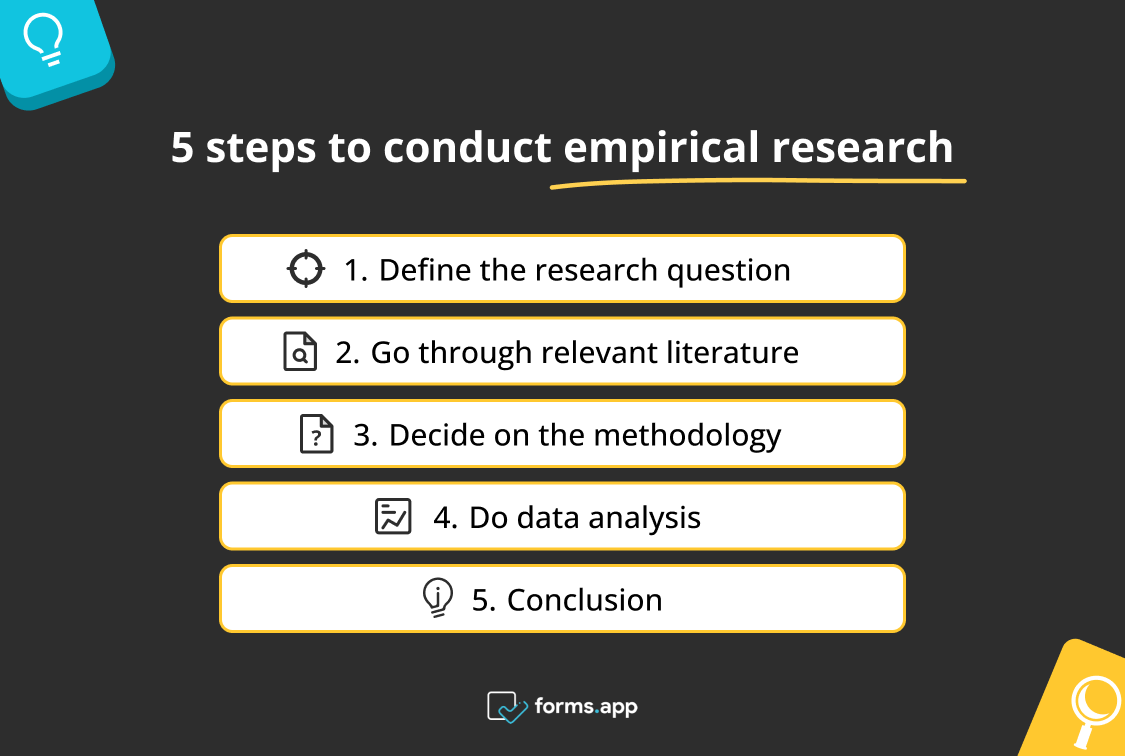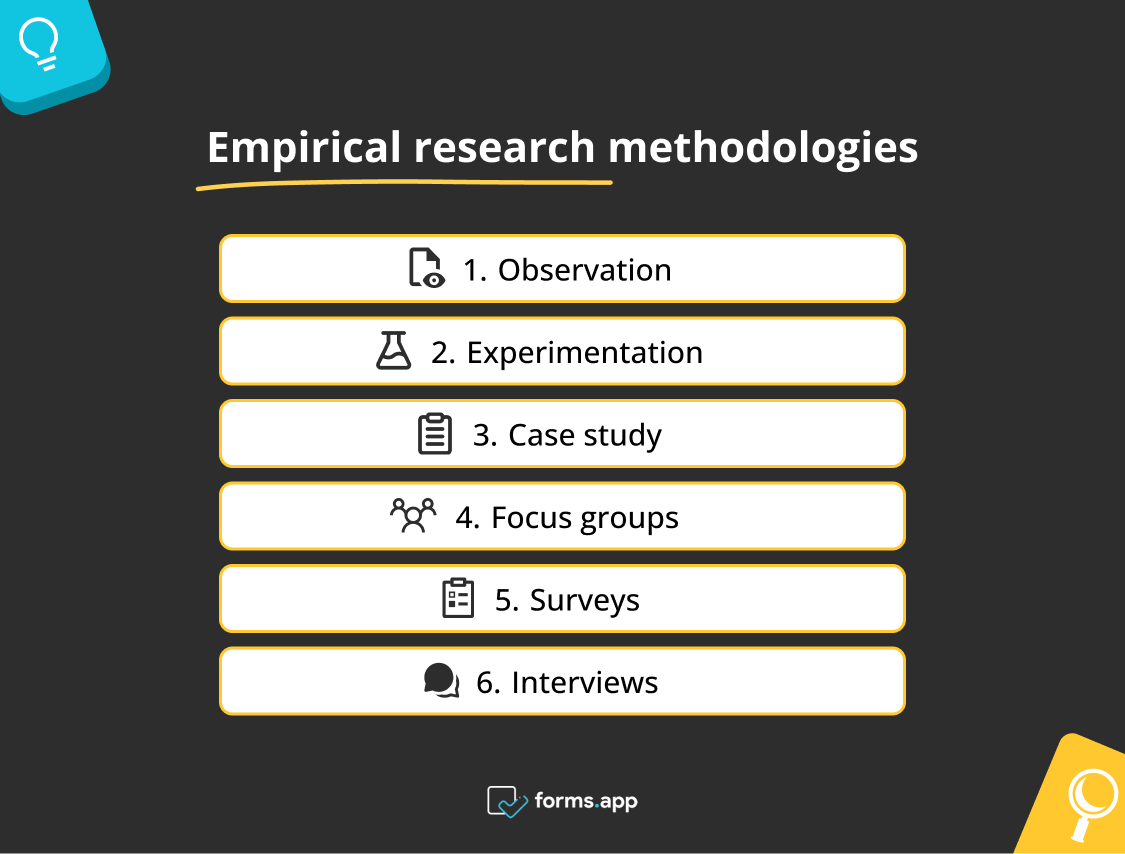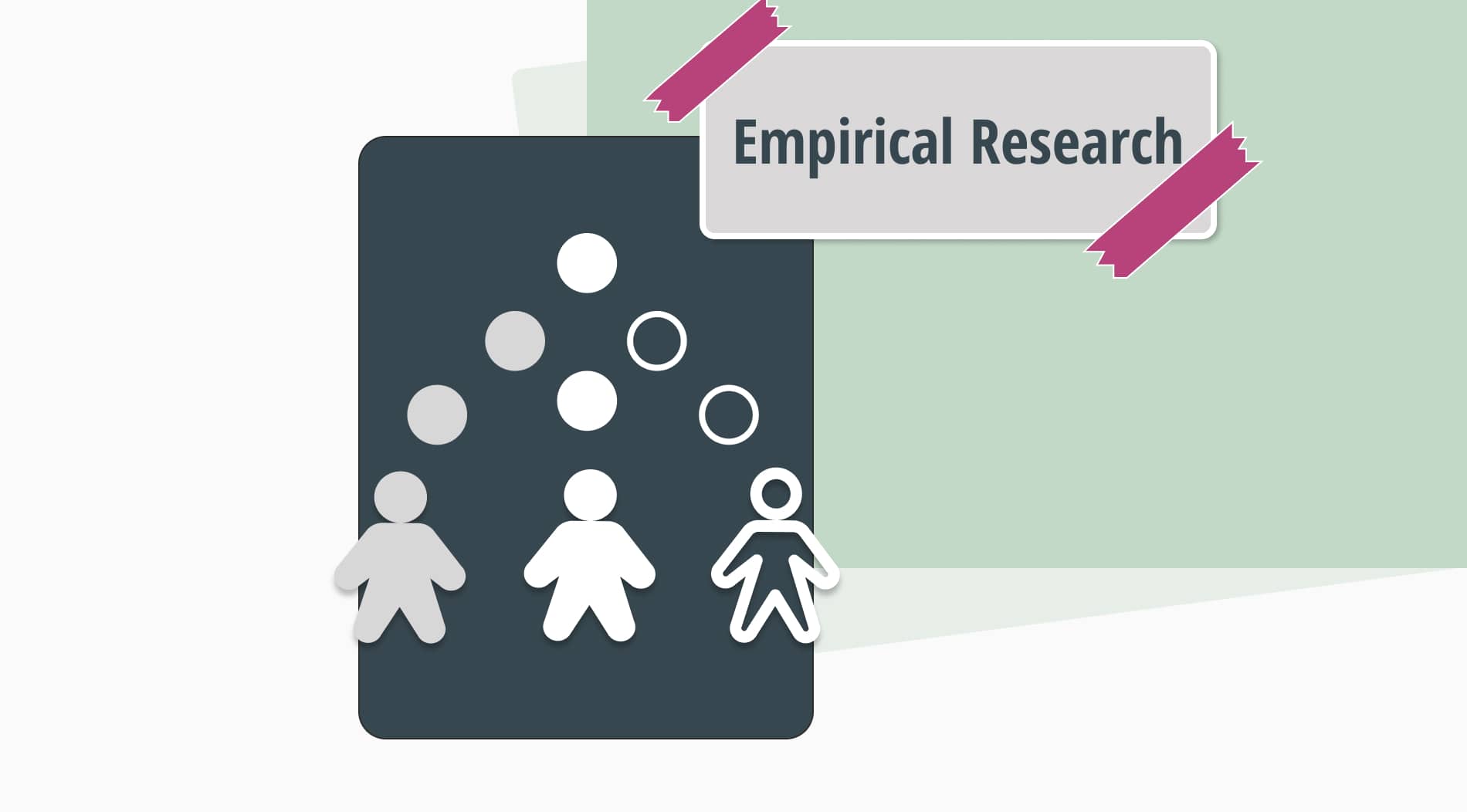Having opinions on matters based on observation is okay sometimes. Same as having theories on the subject you want to solve. However, some theories need to be tested. Just like Robert Oppenheimer says, “Theory will take you only so far.”
In that case, when you have your research question ready and you want to make sure it is correct, the next step would be experimentation. Because only then you can test your ideas and collect tangible information. Now, let us start with the empirical research definition:
What is empirical research?
Empirical research is a research type where the aim of the study is based on finding concrete and provable evidence. The researcher using this method to draw conclusions can use both quantitative and qualitative methods. Different than theoretical research, empirical research uses scientific experimentation and investigation.
Using experimentation makes sense when you need to have tangible evidence to act on whatever you are planning to do. As the researcher, you can be a marketer who is planning on creating a new ad for the target audience, or you can be an educator who wants the best for the students. No matter how big or small, data gathered from the real world using this research helps break down the question at hand.
When to use empirical research?
Empirical research methods are used when the researcher needs to gather data analysis on direct, observable, and measurable data. Research findings are a great way to make grounded ideas. Here are some situations when one may need to do empirical research:
1. When quantitative or qualitative data is needed
There are times when a researcher, marketer, or producer needs to gather data on specific research questions to make an informed decision. And the concrete data gathered in the research process gives a good starting point.
2. When you need to test a hypothesis
When you have a hypothesis on a subject, you can test the hypothesis through observation or experiment. Making a planned study is a great way to collect information and test whether or not your hypothesis is correct.
3. When you want to establish causality
Experimental research is a good way to explore whether or not there is any correlation between two variables. Researchers usually establish causality by changing a variable and observing if the independent variable changes accordingly.
Types of empirical research
The aim of empirical research is to collect information about a subject from the people by doing experimentation and other data collection methods. However, the methods and data collected are divided into two groups: one collects numerical data, and the other one collects opinion-like data. Let us see the difference between these two types:
Quantitative research
Quantitative research methods are used to collect data in a numerical way. Therefore, the results gathered by these methods will be numbers, statistics, charts, etc. The results can be used to quantify behaviors, opinions, and other variables. Quantitative research methods are surveys, questionnaires, and experimental research.
Qualitiative research
Qualitative research methods are not used to collect numerical answers, instead, they are used to collect the participants’ reasons, opinions, and other meaningful aspects. Qualitative research methods include case studies, observations, interviews, focus groups, and text analysis.
5 steps to conduct empirical research

Necessary steps for empirical research
When you want to collect direct and concrete data on a subject, empirical research is a great way to go. And, just like every other project and research, it is best to have a clear structure in mind. This is even more important in studies that may take a long time, such as experiments that take years. Let us look at a clear plan on how to do empirical research:
1. Define the research question
The very first step of every study is to have the question you will explore ready. Because you do not want to change your mind in the middle of the study after investing and spending time on the experimentation.
2. Go through relevant literature
This is the step where you sit down and do a desk research where you gather relevant data and see if other researchers have tried to explore similar research questions. If so, you can see how well they were able to answer the question or what kind of difficulties they faced during the research process.
3. Decide on the methodology
Once you are done going through the relevant literature, you can decide on which method or methods you can use. The appropriate methods are observation, experimentation, surveys, interviews, focus groups, etc.
4. Do data analysis
When you get to this step, it means you have successfully gathered enough data to make a data analysis. Now, all you need to do is look at the data you collected and make an informed analysis.
5. Conclusion
This is the last step, where you are finished with the experimentation and data analysis process. Now, it is time to decide what to do with this information. You can publish a paper and make informed decisions about whatever your goal is.
Empirical research methodologies

Some essential methodologies to conduct empirical research
The aim of this type of research is to explore brand-new evidence and facts. Therefore, the methods should be primary and gathered in real life, directly from the people. There is more than one method for this goal, and it is up to the researcher to use which one(s). Let us see the methods of empirical research:
Observation
The method of observation is a great way to collect information on people without the effect of interference. The researcher can choose the appropriate area, time, or situation and observe the people and their interactions with one another. The researcher can be just an outside observer or can be a participant as an observer or a full participant.
Experimentation
The experimentation process can be done in the real world by intervening in some elements to unify the environment for all participants. This method can also be done in a laboratory environment. The experimentation process is good for being able to change the variables according to the aim of the study.
Case study
The case study method is done by making an in-depth analysis of already existing cases. When the parameters and variables are similar to the research question at hand, it is wise to go through what was researched before.
Focus groups
The case study method is done by using a group of individuals or multiple groups and using their opinions, characteristics, and responses. The scientists gather the data from this group and generalize it to the whole population.
Surveys
Surveys are an effective way to gather data directly from people. It is a systematic approach to collecting information. If it is done in an online setting as an online survey, it would be even easier to reach out to people and ask their opinions in open-ended or close-ended questions.
Interviews
Interviews are similar to surveys as you are using questions to collect information and opinions of the people. Unlike a survey, this process is done face-to-face, as a phone call, or as a video call. It's a good idea to record your interviews from start to finish. Just ensure you make your face-to-face, video or call recording disclosure prior to the actual recording and obtain consent from the relevant parties.
Advantages of empirical research
Empirical research is effective for many reasons, and helps researchers from numerous fields. Here are some advantages of empirical research to have in mind for your next research:
- Empirical research improves the internal validity of the study.
- Empirical evidence gathered from the study is used to authenticate the research question.
- Collecting provable evidence is important for the success of the study.
- The researcher is able to make informed decisions based on the data collected using empirical research.
Disadvantages of empirical research
After learning about the positive aspects of empirical research, it is time to mention the negative aspects. Because this type may not be suitable for everyone and the researcher should be mindful of the disadvantages of empirical research. Here are the disadvantages of empirical research:
- As it is similar to other research types, a case study where experimentation is included will be time-consuming no matter what. It has more steps and variables than concluding a secondary research.
- There are a lot of variables that need to be controlled and considered. Therefore, it may be a challenging task to be mindful of all the details.
- Doing evidence-based research can be expensive if you need to complete it on a large scale.
- When you are conducting an experiment, you may need some waivers and permissions.
Frequently asked questions about empirical research
Empirical research is one of the many research types, and there may be some questions in mind about its similarities and differences to other research types.
The data collected by empirical research can be qualitative, quantitative, or a mix of both. It is up to the aim of researcher to what kind of data is needed and searched for.
As quantitative research heavily relies on data collection methods of observation and experimentation, it is, in nature, an empirical study. Some professors may even use the terms interchangeably. However, that does not mean that empirical research is only a quantitative one.
Empirical studies are based on data collection to prove theories or answer questions, and it is done by using methods such as observation and experimentation. Therefore, empirical research relies on finding evidence that backs up theories. On the other hand, theoretical research relies on theorizing on empirical research data and trying to make connections and correlations.
Conceptual research is about thoughts and ideas and does not involve any kind of experimentation. Empirical research, on the other hand, works with provable data and hard evidence.
Some scientists may use these two terms interchangeably however, there is a difference between them. Applied research involves applying theories to solve real-life problems. On the other hand, empirical research involves the obtaining and analysis of data to test hypotheses and theories.
Final words
Empirical research is a good means when the goal of your study is to find concrete data to go with. You may need to do empirical research when you need to test a theory, establish causality, or need qualitative/quantitative data. For example, you are a scientist and want to know if certain colors have an effect on people’s moods, or you are a marketer and want to test your theory on ad places on websites.
In both scenarios, you can collect information by using empirical research methods and make informed decisions afterward. These are just the two of empirical research examples. This research type can be applied to many areas of work life and social sciences. Lastly, for all your research needs, you can visit forms.app to use its many useful features and over 1000 form and survey templates!
Defne is a content writer at forms.app. She is also a translator specializing in literary translation. Defne loves reading, writing, and translating professionally and as a hobby. Her expertise lies in survey research, research methodologies, content writing, and translation.
- What is empirical research?
- When to use empirical research?
- Types of empirical research
- 5 steps to conduct empirical research
- Empirical research methodologies
- Observation
- Experimentation
- Case study
- Focus groups
- Surveys
- Interviews
- Advantages of empirical research
- Disadvantages of empirical research
- Frequently asked questions about empirical research
- Final words



